A prominent Ghanaian academic has raised concerns about the country’s policy-making process, describing it as “KATANOMICS” – a system where politicians prioritize short-term gains over long-term policy sustainability. According to the academic, this approach has led to a lack of accountability for policy mistakes and a disconnect between policy and politics.
The Zipline Example
The academic cited the Zipline drone delivery program as a prime example of this dysfunction. Despite initial concerns about the program’s cost-effectiveness and sustainability, it was rolled out on a large scale without proper planning or budgeting. The program’s costs have mounted, with millions of dollars in unpaid bills accumulating.
Lack of Transparency and Accountability
The academic noted that there has been no official independent monitoring and evaluation of the program, and studies commissioned by Zipline itself have not provided a full cost-benefit analysis. This lack of transparency and accountability has made it difficult to assess the program’s effectiveness.
Call for National Learning
The academic emphasized the need for Ghana to adopt a more rigorous and transparent approach to policy-making, one that prioritizes national learning and accountability. This would involve careful analysis of policy results, debate, and contestation over policy decisions, and a commitment to learning from mistakes.
Implications for Ghana’s Development
The academic’s concerns about “KATANOMICS” have significant implications for Ghana’s development. If left unchecked, this systemic dysfunction could continue to undermine the country’s ability to deliver sustainable and effective policies, ultimately affecting the lives of its citizens.
A Way Forward
To address this issue, the academic suggests that Ghana needs to build a policy community that can scrutinize and debate policy decisions, making politicians more accountable for their actions. This would require a shift towards more transparent and inclusive policy-making processes, where citizens and stakeholders can engage in meaningful discussions about policy decisions.
By adopting a more rigorous and transparent approach to policy-making, Ghana can ensure that its policies are effective, sustainable, and responsive to the needs of its citizens.











